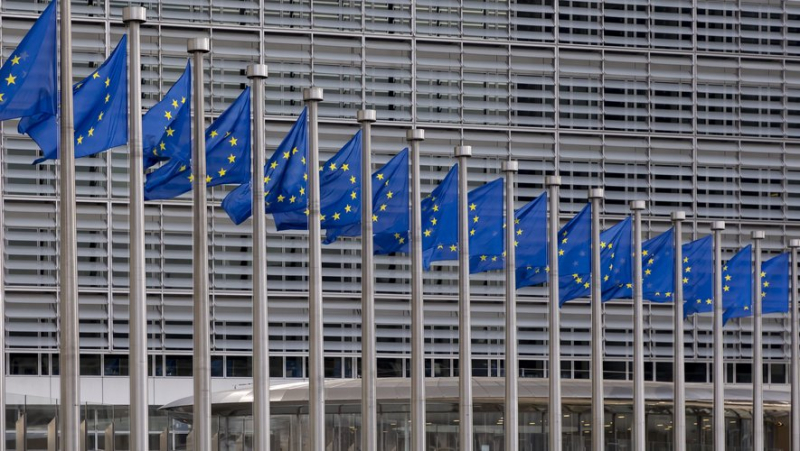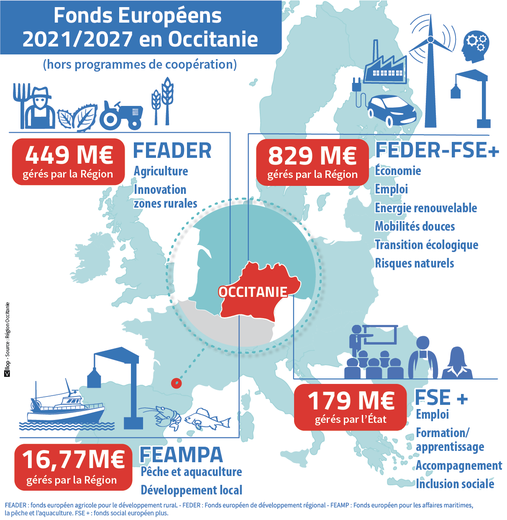Agriculture, education, transport, fishing: how the European Union invests and engages in Occitania

Brussels invests and finances a number of projects in the regions, including Occitanie. MAXPPP – Vincent Isore
Brussels helps the regions via dedicated funds. Without forgetting the common agricultural policy. Decryption.
When assessing the weight of investments and financing from the European Union in the French territories, the regional authority of Occitanie measures it and ;appreciates:"70 % of the European Union budget is devoted to local actions. European funds enable thousands of projects to see the light of day in Occitania, on various themes (agriculture, business support, research, innovation, digital, etc.), to promote employment, social cohesion, sustainable development and energy transition."

This is how, for the period 2021-2027, the EU is investing a total of 1.4 billion euros , as we can see the details opposite.
Or structural funds which finance local projects in the region. To which are added sectoral funds, for which there may be calls for projects, which come under a system of subsidies managed directly by the EU. They help finance, in whole or in part, projects such as the Montpellier-Perpignan high-speed line, for example.
From an LGV line to composting flower pots
Some examples of projects and structures, developed in the thirteen departments of Occitanie, and benefiting from funds European, via programs, schemes, financing and other subsidies specially dedicated to the Regions of the twenty-seven member states of the ;UE.
In bulk, we can therefore cite public health establishments; (for example, 800,000 euros for the Perpignan University Hospital, in order to acquire equipment, with European credits) ens awarded during the 2014-2020 financial year), high schools with better access to digital technology, and high schools residents of the region equipped (all) with a free laptop, the museum of romanity NarboVia à Narbonne (six million euros, also in the previous financial year), 1,600 rehabilitated social housing units, 13 km cycle paths created or the two rail lines great speed. Among other major projects.
But, on another scale, we can also cite, among other beneficiaries of European credits, for example, a dairy cow farm è Saint-Julien-de-Briola, in Aude, the Montpellier inventors of a composting flowerpot or a company with a sorting system for liquid materials in Pouget, in the Hérault.
Moreover, in addition, from the European Regional Development Fund (ERDF), the European Social Fund (ESF +), and funds allocated to rural development, and maritime affairs, fishing, and aquaculture, which the Region manages, European funding also abounds in the region under the common agricultural policy.
The CAP, of which the State, with the European Commission, administers the entire envelope allocated to the region. "45 000 farmers are entitled to it in Occitanie", Nadia Pellefigue, vice-president of the Region for higher education, research, Europe and international relations, recently told us.< /p>
The Region deploys its influence from Brussels
"You have to be present here, it’s essential", Jean-Luc Gibelin, vice-president of the Region for mobility for all and transport infrastructure, recently told us from Brussels. The elected official spoke from the premises of Occitanie Europe, an association born in 2017 (after the merger of the Midi-Pyr & eacute;nées and Languedoc-Roussillon), managed by Yannick Proto and which employs six permanent employees and two interns, in the heart of the European district of Brussels . Wù more than 300 regional and local authorities have opened a representative office.
Including Occitanie Europe. And the President of the Region Carole Delga clarified the mission: "This is not an institutional representation office. We are here so that the Region can take its full part in the directions of European policy. So that the Region can influence and capture European credits. It’s crucial, of course. For LGV, for example: both lines are eligible for the HSL. European credits, which represent 20% of total financing."
And to emphasize that for the calendar year 2021, for example, 1.6 billion euros had been allocated to Occitanie under the CAP, in the form of "direct aid to farms, which gives an idea of the sums arriving in the territory".
An example, among others, of the impact of European funding deployed in the thirteen departments of Occitanie, all sectors of activity combined. This is appreciated all the more by Carole Delga who never fails to remind us that the Region she presides counts "among the three in France which succeed in capturing the most European credits".
I subscribe to read more




